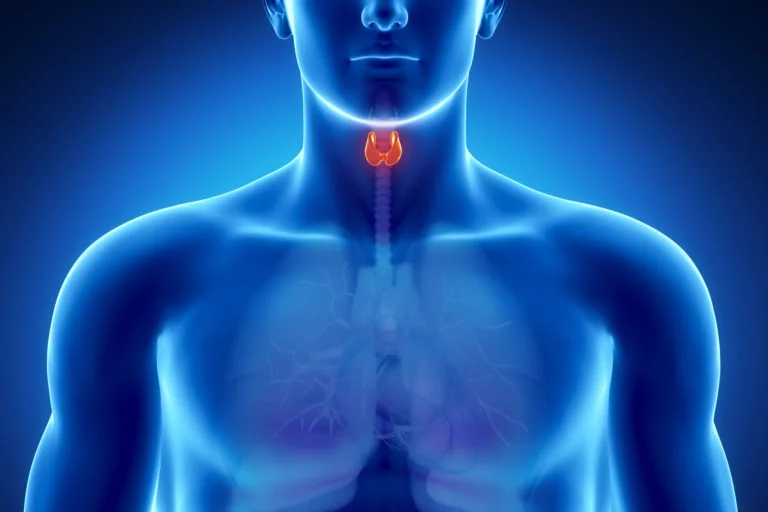Thyroid Problems
- Home
- /
- Thyroid Problems

The thyroid gland influences the body’s metabolic processes through the hormones it produces. Thyroid problems or disorders can include goiter or an enlarged gland, Grave’s disease, toxic adenomas, and so on. The majority of thyroid disorders are caused by abnormal thyroid hormone production. Thyroid problems may be inherited in some cases. When thyroid hormone is produced in excess, the condition is known as hyperthyroidism, and when it is produced insufficiently, the condition is known as hypothyroidism. The majority of thyroid-related issues can be identified and treated. Thyroid disorders cause symptoms ranging from weight loss to weight gain, as well as hair loss to excessive hair growth. Other common symptoms of thyroid problems include high cholesterol levels, poor memory, loss of focus, sudden palpitations and dry or moist skin.
The thyroid is a tiny butterfly-shaped gland located in the neck, directly above the windpipe (trachea). It secretes hormones that regulate your heart rate and body temperature. Too much of these hormones may lead to unpleasant and even significant side effects that may need treatment. An overactive thyroid may affect anybody, although it is around ten times more frequent in women than males and often occurs between the ages of 20 and 40.
An underactive thyroid gland (hypothyroidism) occurs when your thyroid gland does not produce enough hormones. Tiredness, weight gain, and depression are common symptoms of an underactive thyroid. There is no way to avoid having an underactive thyroid. The majority of instances are caused by the immune system attacking and injuring the thyroid gland, or by thyroid damage that happens during various therapies for an overactive thyroid or thyroid cancer.
The only accurate method to determine if you have a problem is to get a blood test that measures your hormone levels. The thyroid function test examines blood levels of thyroid-stimulating hormone (TSH) and thyroxine (T3/T4). A high level of TSH and a low amount of T4 in the blood might indicate that your thyroid is underactive. A low TSH level and high T3 and/or T4 values typically indicate an overactive thyroid. Once the diagnosis has been established and medical treatment has begun, the patient might consider beginning professional Chakra Therapy to enhance and speed up recovery while providing holistic and ultimate healing.
Chakra Therapy is a unique technique to open the blocked Chakras in the body and treat the ailments caused by these blockages. Chakra Therapy is an alternative therapy that does not have any side effects and treats not only the disease but transforms the affected individual to find their purpose in life and face it with renewed energy and vigor.
Chakra therapy opens the Vishuddha Chakra and with the resulting restored energy and vitality the individual can counteract thyroid problems.
Causes
- Overactive thyroid gland
- Underactive thyroid gland
- Pituitary gland malfunctions
- Autoimmune disorder
- Exposure to excessive amounts of iodide
- Specific Medications
Symptoms
- Fatigue
- Weight gain
- Weight loss
- Slowed heart rate
- Increased heart rate
- Sensitivity to heat
- Sensitivity to cold
Chakra Associated with
- Vishuddha Chakra or Throat Chakra
Chakra Blocked By
- Low self-worth/ feeling helpless/not expressing own uniqueness
Chakra Unblocked When
- Expressing and realizing own uniqueness and being creative
Rudraksha for Treating Thyroid Problems
- 11 Mukhi Rudraksha
Gemstone for Treating Thyroid Problems
- Blue Sapphire
Hyperthyroidism (Yang) and hypothyroidism (Yin) are often manifestations of our incapacity to express or do what we desire. No one understands us; we lack the tools to make sense of our thoughts; we are scared that what we say will
not be accepted by others; and we are terrified of the power or violence of what we may say. Behind this reserve, there is always a sense of risk, of danger, which prevents us from expressing ourselves.
The Yang variety (hyperthyroidism) is motivated by a desire for vengeance. This person is always on the go. The inner fire swallows him, and the conflict continues indefinitely. People suffering with hyperthyroidism seem to be engulfed by this inner fire. The fire and the battle, on the other hand, devour without generating since the sole output is reactive and defensive, but not constructive. In other words, we are doing more and more but not becoming better.
The Yin form (hypothyroidism) represents surrender in the face of the inability of self-expression. The inner flame dies. The vital dynamics that were discovered to be excessive in hyperthyroidism are now inadequate. Because the body no longer burns, it stores. Its loudness rises to compensate for the lack of expressiveness. Nodules appear often to signify emotions, wants, lusts, or buried frustrations, and their presence offers further information about their hidden significance.
Rudraksha Ratna Science Therapy (RRST) uses specific Rudraksha and Ratna (gemstone) in precise advanced stringing methodology for chakra awakening and healing.
A blocked Vishuddha Chakra can be opened with the use of Rudraksha, gemstones and other techniques. Choosing the appropriate Rudraksha and Ratna as well as wearing them as per RRST methodology unblocks the Throat Chakra and controls thyroid problems.
